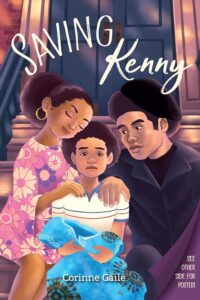 NEW RELEASE
NEW RELEASE
Saving Kenny
In Boston, 1968, Kenny is a timid boy in a family of big personalities. His older brother, Vaughn, is a political activist and Black Panther. His big sister, Gwen, is a dramatic fashionista who wants to be an opera singer. Kenny dreams of becoming a costume designer but must face down teasing from his friends, and his brother’s disapproval. His mother works hard as a hospital housekeeper and seems to always be in a bad mood. She abuses Kenny and his siblings both verbally and physically. His big brother and sister do their best to protect Kenny from their mother, but Vaughn flees to Canada to avoid the draft. When Gwen graduates from high school in a year, she plans to move to New York City to pursue a career in opera. Then Kenny will be left alone with his mother and her abuse, so he must figure out a way to save himself.
Kirkus Review
A 12-year-old African American boy living in the Boston neighborhood of Roxbury in 1968 finds ways to be true to himself and find support within a complicated family situation.
When Kenny Reed’s big sister, Gwen, takes him to see the opera Aida, he becomes enamored with the Egyptian-themed production and decides he wants to become a costume designer-but he doesn’t want his big brother, Vaughn, or his mother to find out about these ambitions. The siblings constantly monitor their abusive mother’s moods to determine if it’s safe to be in the house. Soon Vaughn will graduate high school, however-and Gwen is just one year behind him-which will leave Kenny unprotected. Kenny’s thrilled to be spending the summer with his white friend Thomas Hamilton’s family in Vermont. But that invitation is rescinded after Vaughn encourages Kenny to use a fancy seafood meal he had with the Hamiltons as inspiration for a Black Panther flyer, making Thomas think Kenny’s mocking his father. Rather than going to Vermont, Kenny attends art classes at the Afro-American Arts Academy, where he must decide between taking African drumming or sewing, which he really wants but which Vaughn says is for sissies. Debut author Gaile provides a touching, in-depth look at domestic violence, gender roles, and what it means to be a man, centered on an appealing protagonist whom readers will root for.
A thoughtful, relevant exploration of social, political, and personal upheaval through a child’s eyes.

Fearless Freedom
More than anything, feisty eleven-year-old Bernice Givens wants to be a freedom fighter in the civil rights movement that is sweeping the South. She gets her chance when Dr. Martin Luther King Jr. comes to Birmingham, Alabama, to start a campaign. But after what happens on the day she marches against segregation, Bernice spends her nights fending off bad dreams, her days avoiding the marches and all of her time hiding a painful secret from her friends and family—that she is a deeply afraid.
During the historic spring and summer of 1963, with help from her family and her new friend Betsy, a blind girl from up North who also faces discrimination, Bernice struggles to understand fear and regain the courage to continue her fight against injustice.
Kirkis Review
An engaging, evocative young adult novel about a preadolescent girl’s involvement in the civil rights movement in Birmingham. Eleven year-old Bernice Givens has two major aspirations: to become a Freedom Fighter and to work as a journalist. Growing up within the rigid strictures of a segregated society (in an achingly poignant scene, the first word she learns to read is “colored” so that she will not accidentally offend), Bernice longs to be a part of the struggle for equality. She avidly follows news of the civil rights movement and maintains a scrapbook of major events, believing that actual action is still years away for her. So when news breaks of the planned children’s march, Bernice is thrilled by the opportunity despite her mother’s apprehension and ultimate prohibition. Bernice goes anyway, never suspecting that her participation will have consequences that will change and haunt her, though she ultimately emerges stronger from the experience. Debut author Gaile offers pacing that is slow enough to allow nuances to develop but swift enough to maintain reader interest. She has an ear for genuine-sounding dialogue and interactions, and is masterful at exploring emotional complexities at the appropriate developmental level; her descriptions of Bernice’s parents and their ambivalence about their daughter’s activism are particularly authentic and resonant. Bernice herself is about as appealing a heroine as one could hope for, a believable blend of childish naïveté and sophisticated ideology. Most of the supporting characters are also convincingly portrayed, though a few are disappointingly one-dimensional, even considering their minor roles. The narrative is straightforward and focused solely on the main plot; this can feel a bit heavy-handed at times but is overall fitting for the length of the book. There are few surprises for those readers with a basic familiarity of the civil rights movement, but this work is a suitable introduction for those without that familiarity. And, with the 50th anniversary of the March on Washington just past, this book could not be more timely and relevant. A moving, triumphant novel encapsulating a young girl’s personal struggle for equality within the larger movement.
